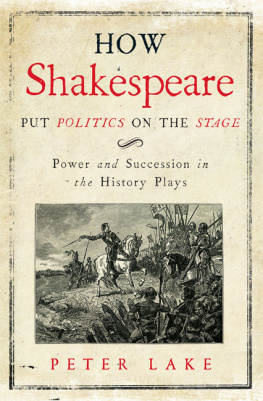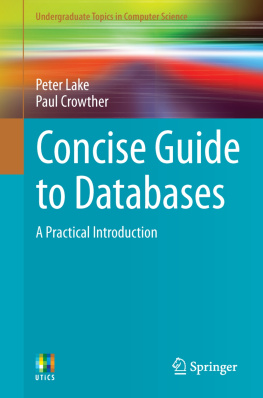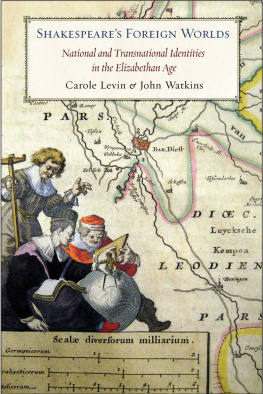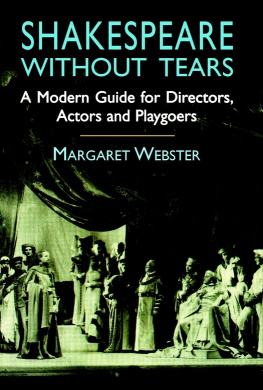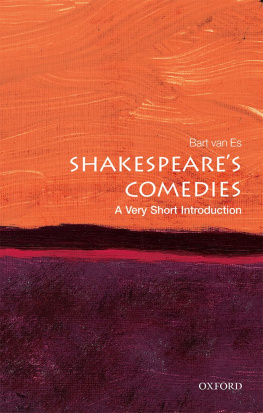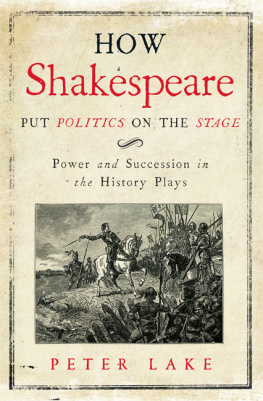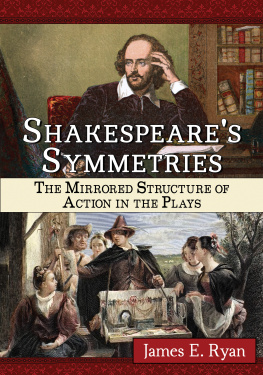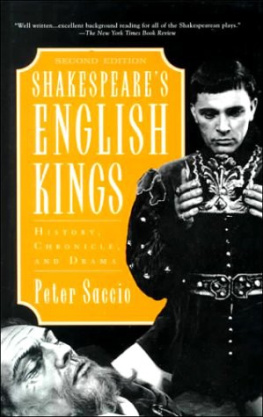HOW SHAKESPEARE PUT POLITICS ON THE STAGE

Published with assistance from the foundation established in memory of Oliver Baty Cunningham of the Class for 1917, Yale College.
Copyright 2016 Peter Lake
All rights reserved. This book may not be reproduced in whole or in part, in any form (beyond that copying permitted by Sections 107 and 108 of the U.S. Copyright Law and except by reviewers for the public press) without written permission from the publishers.
For information about this and other Yale University Press publications, please contact:
U.S. Office:
Europe Office:
Typeset in Minion Pro by IDSUK (DataConnection) Ltd
Printed in Great Britain by TJ International Ltd, Padstow, Cornwall
Library of Congress Cataloging-in-Publication Data
Names: Lake, Peter, author.
Title: How Shakespeare put politics on the stage : power and succession in the history plays / Peter Lake.
Description: New Haven : Yale University Press, 2016.
Identifiers: LCCN 2016017316 | ISBN 9780300222715 (hardback)
Subjects: LCSH: Shakespeare, William, 1564-1616Histories. | Historical drama, EnglishHistory and criticism. | Literature and history. | Politics in literature. | BISAC: HISTORY / Europe / Great Britain. | LITERARY CRITICISM / Shakespeare. | HISTORY / Modern / 16th Century. | POLITICAL SCIENCE / History & Theory.
Classification: LCC PR2982 .L35 2016 | DDC 822.3/3dc23
LC record available at https://lccn.loc.gov/2016017316
A catalogue record for this book is available from the British Library.
10 9 8 7 6 5 4 3 2 1
For San, the first person not to finish this book
Contents
Introduction and acknowledgements
I started to think about the basic questions that lie behind this book during performances of various Shakespeare plays that I saw during the 1990s. Crucial here were a production of Troilus and Cressida at the National Theatre and a student production in Cambridge of King John. While I was watching Troilus, it occurred to me that a play about an interminable war, the rationale for which no one on either side can coherently recall, and the justice of which no one can quite defend, might have had a certain resonance in 1601, when the play was apparently written. I also thought that a play that pits a faction of policy-makers, led by an old and rather dull man, Nestor, and his altogether more ruthless and astute younger protg, Ulysses, against a faction of soldiers, a rivalry in which the soldiers view the policy wonks with contempt because of their weakness, and the policy wonks view the soldiers with contempt because of their stupidity, might have reminded its first audiences of the late Elizabethan political scene as it first polarised between the Essex faction and the Cecils, and then imploded into the debacle of the Essex rebellion
But what really got my attention was a short exchange from the first scene of Shakespeares King John. As John and the king of France dispute Johns claim to the throne of England, John proclaims our strong possession is our right for us, only to be corrected by his mother who reminds him, in a remarkable stage whisper, your strong possession much more than your right. These few words seemed to me to have a dramatic impact on the meaning of the play. They show that both John and his mother know that he is a usurper and that his nephew, Arthur, is the true king and that much of the posing about right that follows is empty non-sense. The exchange sets up the bastards (and indeed the audiences) realisation that the politics of princes are the politics of what the bastard calls commodity; a question of possession and of might, rather than of right. The play shows John struggling first to secure control of his nephew Arthurs person and then trying to have him killed. John is responsible for Arthurs death, but desperate to put the blame for that death on the person he has chosen to do the deed. All of which seemed to me to establish a quite striking parallel between King John and Queen Elizabeth, on the one hand, and Arthur and Mary, queen of Scots, on the other.
That realisation in turn prompted a series of linked questions: if I noticed those parallels, might not members of an Elizabethan audience have noticed them as well? And if they did, where might the consequent chains of association and application of the action on stage to contemporary events and concerns have led them? And what might such processes of interpretation have to tell us about the relationship of the drama to its audience, and indeed to the politics of late Elizabethan England? And what might those sorts of connection tell us, in turn, about the nature of the late Elizabethan political scene, and the ways in which contemporaries actually thought about politics?
These remained relatively idle thoughts of the sort that occur to you while watching a play. However, some years later, reading an entirely different set of texts convinced me that such questions might have real potential and indeed significance, as subjects of historical research and enquiry. I had become interested in a number of Catholic pamphlets that sought to describe the Elizabethan regime as a conspiracy of evil counsel, a functional tyranny, yet one without a tyrannical monarch at its heart. Reading perhaps the greatest of them, Leicesters commonwealth, I noticed how frequently and insistently that tract returned to certain incidents in recent and indeed remote English history as guides to what was happening now in England, to what would happen next, if something were not done now about the succession question and the conspiracy of evil counsel now surrounding the queen. The historical figures, incidents and reigns in question those of Henry VI, Richard III, Richard II and Henry IV, and King John were precisely the ones about which Shakespeare and others were later to write plays. That struck me as interesting and I came to wonder how far we might read both plays and pamphlets as comments upon, indeed as ways to recuperate the contemporary understandings of, essentially the same historical conjuncture or set of issues.
In 2002 I was given a fellowship to work for a year at the Folger Shakespeare Library, on a project centred on the Roman Catholic tracts. A central task that year was to get to grips with Robert Parsons great book The conference about the next succession. In so doing, I discovered how Parsons used the reigns of King John and of Richard II to show the English polity working precisely as he said it could and should; that is to say, as an elective monarchy with a residual power inherent in the commonwealth to resist or depose tyrants and to divert the course of hereditary succession in the name of the common or general good. While I was at the Folger, no doubt intoxicated by the plethora of Shakespeareana with which that wonderful institution surrounds its readers, I decided, more or less as an experiment, to write an account of Shakespeares plays about King John and Richard II from the perspective provided by Parsons. One thing led to another, and I embarked on an attempt to read other of his history plays in a similar light.
While what I found upon doing this was all news to me, I rapidly discovered that it was news to no one else, and that it was virtually impossible for me at least to say much of anything very novel about Shakespeare. However, I also formed the impression, which I retain, that it might be possible to use some of Shakespeares plays, read in conjunction with my Catholic texts and other such materials, as a way to something interesting and important about the politics and political culture of the 1590s.
Initially, I envisioned a book that would encompass a full-scale analysis of the tracts and the plays, all integrated into something like a political narrative. Very rapidly, however, I came to realise that such a project could not be coherently encompassed within one volume, however capacious. So what had started out as one book became two, and over the next decade or more, I proceeded to work on the two in tandem. This was not always a conscious choice. In 20067 I was on a fellowship at the Huntington, ostensibly to finish a book on Shakespeares history plays, but found myself spending a good part of the second half of that year working on the Catholic project, diverted thereto by, amongst other things, a lunch time talk on Parsons
Next page
